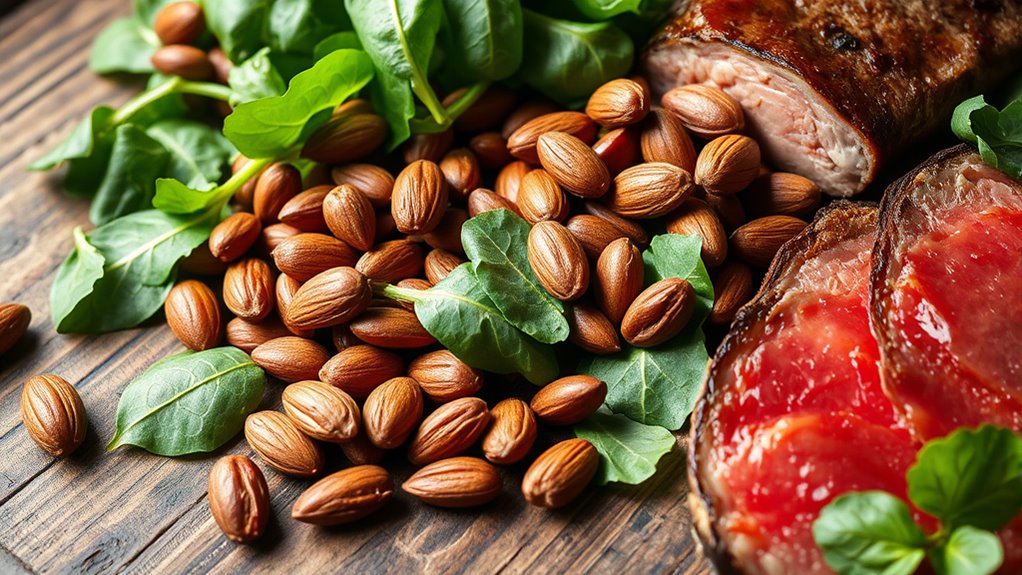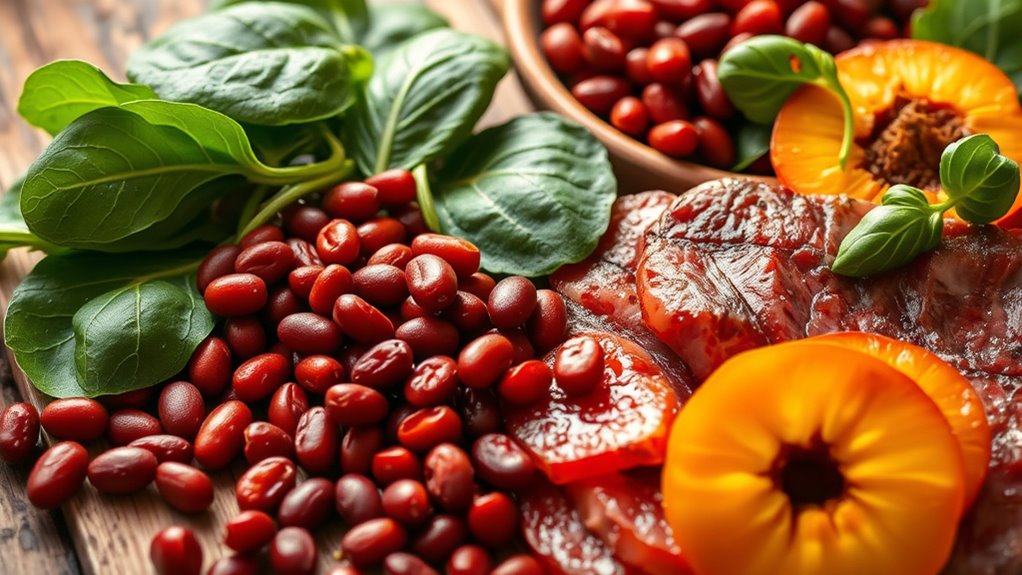To fight fatigue during the third trimester, include iron-rich foods like lean meats, leafy greens, and legumes in your meals. Pair these with vitamin C sources such as citrus fruits or peppers to boost iron absorption. Avoid drinking coffee or tea at mealtimes, as they can inhibit absorption. Using prenatal supplements can also help maintain your iron levels. Keep exploring for more tips on staying energized and supporting your baby’s growth.
Key Takeaways
- Incorporate lean meats like beef and chicken for highly bioavailable iron sources.
- Add vitamin C-rich foods like citrus fruits and peppers to enhance iron absorption.
- Include leafy greens such as spinach and kale in daily meals for plant-based iron.
- Limit coffee, tea, and dairy intake around iron-rich meals to prevent absorption interference.
- Use prenatal supplements with iron, as recommended by your healthcare provider, to meet increased needs.

During the third trimester, your body’s iron needs increase considerably to support your growing baby and prepare for labor and postpartum recovery. This surge in demand means you need to be mindful of your iron intake to combat fatigue and keep your energy levels steady. While prenatal supplements can help fill in the gaps, focusing on iron-rich foods is essential for naturally boosting your iron levels and guaranteeing your body absorbs it efficiently. Incorporating foods like lean meats, leafy greens, and legumes can make a significant difference. These iron-rich foods are not only nutritious but also easy to include in your daily meals, helping you fight fatigue and stay energized through your busy days.
However, it’s important to understand iron absorption techniques to maximize the benefits of these foods. Vitamin C plays a key role here, so pairing iron-rich foods with sources like citrus fruits, bell peppers, or tomatoes can enhance absorption. For example, adding sliced strawberries to your cereal or squeezing lemon over spinach can make a big difference. On the other hand, certain foods and drinks, like coffee, tea, and calcium-rich dairy, can hinder iron absorption, so it’s best to consume them separately from your main iron sources. Timing your meals this way guarantees your body gets the most out of the iron you consume.
Additionally, if you’re taking prenatal supplements, check with your healthcare provider about their iron content and how they fit into your diet. Sometimes, supplements contain forms of iron that are easier for your body to absorb, especially if you’re experiencing fatigue or symptoms of iron deficiency. Combining these supplements with iron-rich foods and proper absorption techniques can help prevent anemia, a common concern during the third trimester. Remember, maintaining adequate iron levels is vital not just for your energy, but also for your baby’s growth and development.
Frequently Asked Questions
Can Vegetarians Meet Iron Needs Without Animal Products?
You can meet your iron needs without animal products by focusing on plant-based iron sources like lentils, spinach, and fortified cereals. To boost vegetarian iron absorption, pair these foods with vitamin C-rich options like oranges or bell peppers. Avoid tea and coffee during meals, as they can hinder absorption. With careful planning, you’ll guarantee enough iron intake and maintain your energy levels throughout your pregnancy.
Are Iron Supplements Necessary if I Eat Iron-Rich Foods?
You might be asking if you need iron supplements if you’re already eating iron-rich foods. While a balanced diet helps with iron absorption, sometimes dietary intake isn’t enough, especially during pregnancy. If your iron levels are low, your doctor may recommend supplements to fill the gap. Timing matters—taking supplements with vitamin C-rich foods can boost absorption, but don’t rely solely on diet; follow your healthcare provider’s advice.
How Does Iron Deficiency Affect My Baby’s Development?
Iron deficiency can substantially impact your baby’s development. It may slow fetal brain development and hinder placental growth, both vital for healthy pregnancy outcomes. When you’re low on iron, your body struggles to supply enough oxygen and nutrients to your baby, increasing risks of premature birth or low birth weight. Ensuring adequate iron intake supports ideal fetal development, helping your little one grow strong and healthy throughout your pregnancy.
What Are Signs of Iron Overload During Pregnancy?
Imagine your body’s iron stores overflowing like a leaky faucet—this is iron overload. During pregnancy, it can hide beneath the surface, raising pregnancy risks like fatigue, joint pain, or abdominal discomfort. You might notice symptoms like weakness or irregular heartbeat. Keep an eye out and consult your healthcare provider to prevent iron overload from turning your pregnancy journey into a turbulent ride. Monitoring levels guarantees you stay safe and healthy.
Can I Consume Too Much Iron From Foods?
You can consume too much iron from foods if your intake exceeds your body’s needs, which may interfere with iron absorption from other nutrients. While it’s unlikely to get too much iron from diet alone, overdoing supplements can cause issues. Maintaining dietary balance is key, so focus on iron-rich foods in moderation and consult your healthcare provider to ensure you’re meeting, not surpassing, your iron requirements during pregnancy.
Conclusion
So, next time you’re feeling like a deflated balloon in your third trimester, remember those iron-rich foods are your secret weapon. Who knew that spinach, lean meats, and beans could turn you back into Supermom? Skip the fatigue, embrace the power foods, and give your body the boost it needs—because surviving pregnancy shouldn’t feel like a full-time job. Iron up and show that tiredness the door; you’ve got this (and snacks to prove it)!









